#but I ultimately left it like this cause Rio actually has a dagger
Explore tagged Tumblr posts
Text
Agatha: Poison is a magic transmutation potion that turns people into corpses.
Rio: This knife is actually a magic wand.
Billy: Meet me in the Denny’s parking lot for a wizard duel.
Alice: *cocks gun* Magic missile.
Jen: What the fuck is wrong with you people.
#I feel like Rio and Alice could be switched for this#but I ultimately left it like this cause Rio actually has a dagger#agatha all along#agatha harkness#rio vidal#billy maximoff#teen (agatha all along)#billy kaplan#alice wu gulliver#jennifer kale#source: ???#incorrect agatha all along#agatha all along spoilers
90 notes
·
View notes
Text
Miles Morales: Ultimate Spider-Man (2014-2015) - Not with a Bang, but a whimper
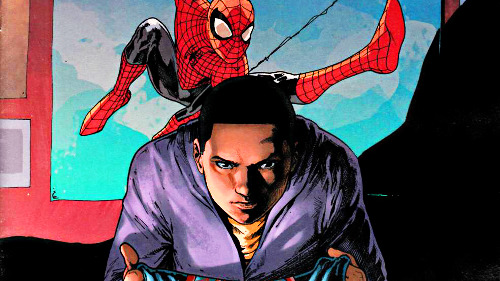
Post Ultimate Comics Spider-Man #19, Miles Morales’ written career as Spider-Man has not been great. After fridging one of the only central supporting female characters in his cast – Rio Morales, his mother – the state of the narrative became preoccupied with manpain, and framing the grief of a teenage boy as, in the words of Miles Morales, someone who “didn’t understand what it meant to be Spider-Man” (Ultimate Cataclysm: Spider-Man #1), which required his entire supporting cast to shame and emotionally manipulate him back into the job.
If there was any good that came out of the last five issues of UCSM, it was probably the introduction of Ultimate Cloak and Dagger and Ultimate Taskmaster.
Miles Morales: The Ultimate Spider-Man, unfortunately, offers very little in the way content improvement outside of one side story and its art direction. Otherwise, it doubles back in circles on subjects and issues that should’ve been laid to rest and ends on an inconclusive whimper.
Ultimate Spider-Man #200 + #Issues #1-7
Death in comic books means nothing, and holds no weight unless you’re a wildly unpopular (or non-white) character that any given publication is looking to get rid of in order to appease their narrow minded (and white) audience. When the Ultimate Marvel universe was created, one of the creeds it presumably lived by was that “death mattered”. When a character died, it would mean something, it would impact the narrative, and every character that died would remain dead.
It’s a shame, then, when they chose to stick their guns, they let Jeph Loeb decimate almost half of the Ultimate Universe’s roster in one of the uglier displays of wanton violence, sexism, and just plain shit writing, with the 2011 “Blockbuster Event” Ultimatum. Ultimatum more or less ensured, despite maintaining the promise that no one would return from the dead, none of the deaths mattered – a lot of it was just Loeb masturbating to his own cruelty if we’re being honest.
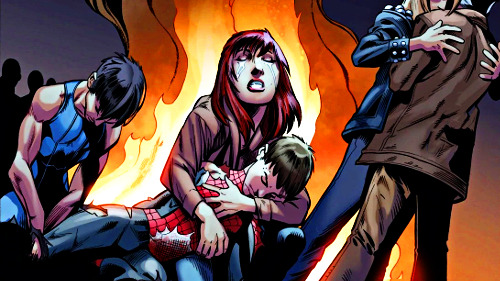
With the “Death of Spider-Man”, Brian Michael Bendis added salt to an otherwise unhealed wound that was Ultimatum, which wasn’t even a year old at that point. To his credit, he made Peter Parker’s death matter – book ending it with the first villain that more or less was responsible for the creation of Spider-Man (Norman Osborn) – with reverberating consequences throughout most surviving series in the UM. Yet, following the introduction of Miles Morales – the new and Black Spider-Man (reportedly meant to honor Bendis’ Black children, whom I pity) – you could tell, in the years preceding the removal of Peter Parker as the protagonist of the Spider-Man title, Bendis was regretting his decision.
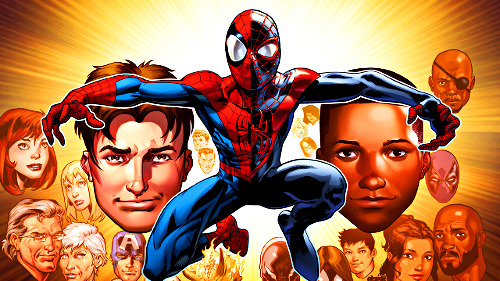
After a 160 issue run (where Peter made actual appearances and was the protagonist until his death), the questionably numbered Ultimate Spider-Man #200, once again sees Bendis fantasizing about what he might’ve done had he not killed Peter Parker and replaced him with Miles Morales. Most of the original cast of characters that were central to Peter Parker’s story – plus Miles and Ganke – gather together at the Parker House at the behest of May Parker and Gwen Stacy (who appears to be a creep perving on underage teen boys no matter what), to commemorate the life of the late Peter Parker. Considering the previous three iterations of “Memorializing Peter Parker” in the UM, Ultimate Spider-Man #200 brings nothing new to the table, but should’ve been a red flag to anyone paying attention to the declining quality of Miles’ title.
Miles’ final title in the Ultimate Universe, Miles Morales: The Ultimate Spider-Man, begins with the reintroduction of a supposed-to-be-dead Norman Osborn – in the custody of S.H.I.E.L.D. – and two generic Spider-Man copycats robbing banks. There’s nothing really of note to say about the first seven issues of this thirteen issue title. Bendis decides, with the Ultimate Marvel universe doing the death rattle, to undo the death of both Osborn and Peter Parker – with Peter getting a half-assed excuse for his being brought back from the dead (to sum it up: “because reasons”).
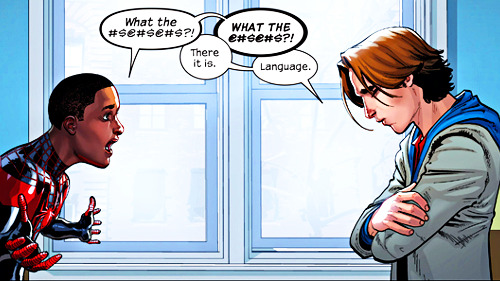
I don’t think a Spider-Man comic has made me quite as angry as this series has. In the moment I read the issue wherein Peter Parker tells Miles, “It’s time for the Original Spider-Man to get back into the game”, I could’ve torn the book into shreds and smote its ruins if I thought it was going to hurt Marvel’s sales and not be an even greater waste of my spent $3.99.
“I can’t believe we’re beating this dead horse again” was what I was thinking and I just stopped buying the book altogether. I think that the first step to mine ceasing to see Miles Morales as a legitimate character, but wasted potential in the hands of non-Black creatives. I only ended up reading the trades for the sake of reference and fact checking and it’s only this year, three-four years after the fact that I bothered to do that. The only thing worth noting about the first seven issues of this title is that it sets up the last four, which are even worse.
Cataclysm: Ultimate Spider-Man #1-3 + Issues #8-9
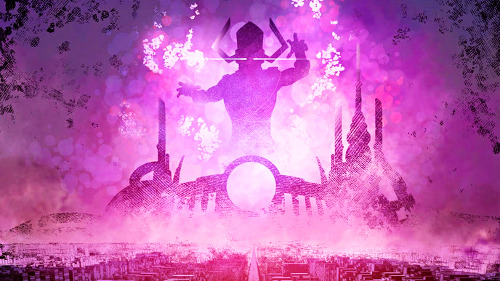
Cataclysm: Ultimate Spider-Man is one of seven miniseries titles part of the “Blockbuster Event” known as Cataclysm, which sees Ultimate Galactus (or 616 Galactus, I’m not sure which tbh. There’s very little difference between the two when you get to the nitty-gritty) attempting to destroy the 1610 universe and devour it all. You get the distinct feeling that, before someone came up with Secret Wars, Cataclysm was meant to be the true end of the Ultimate Universe – but someone upstairs changed their mind and rendered it to a mere false start. Long story short: The grand majority – if not all of – the Ultimates (the Avengers of the 1610 universe) are killed or sent into the void with Galactus by Ultimate Shadowcat – who is later hailed savior of the world. The All-New Ultimates are formed.
Das it.
But, within Miles’ slice of the Cataclysm story, Bendis finally decides to focus on the elephant in the room: Jefferson Davis and his open and his fantasy xenophobia toward superhumans and how it has literally silenced his own son from admitting to his double life as Spider-Man. Moreso since the death of his mother, Rio Morales, at the hands of Ultimate Venom. I’ll be perfectly honest – I don’t think Jefferson Davis is a great guy – I actually ended up liking his no-account brother (Aaron Davis, gone too soon) far more because he was upfront about his ideals and his mission statement. He never pretended or tried to be a better person. He was just rotten and enjoyed it.
For that one piece of sage advice Jefferson offered Miles in the earliest tenure of his first title, Jefferson is the perfect example of a man who expects his son to “do as he says, and as I do”, but expects no consequences visited upon him whenever he dehumanizes people. He’s a walking metaphor for the heterosexual Black father who spews homophobic slurs in casual conversation around their gay daughter or son and I’m sure as hell that was intentional despite the incompatibility of the allegory.
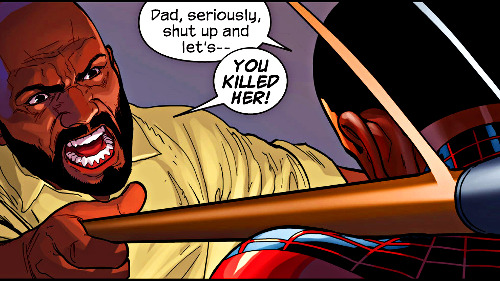
Cataclysm: Ultimate Spider-Man doesn’t do much to repair his character, if anything it makes him thrice times worse. When Galactus starts wrecking all of New York City and Brooklyn, Miles, Bombshell (Lana Baumgartner) and Cloak and Dagger, struggle to save the people caught in the monster’s wake – all while recounting where they were when the Ultimatum event occurred.
In Miles’ flashback, we see Jefferson lose his head over the knowledge that the title wave was caused by a mutant (Magneto), all while loudly proclaiming everyone stuck in traffic was going to die. The most important nugget of information taken away from Miles’ flashback is the knowledge that his father more or less promised that he would abandon or disown Miles if he ever found out his son (then, probably only 11 or 12 years old at the time) was a superhuman.
I never had much sympathy for Davis (I tolerated him because of Rio), but the moment Miles tries to convince his father to come with him out of the city to safety, and Jefferson decides to blame a now fourteen year old Miles for the death of Rio and Aaron, I just outright hated him. Cataclysm: Ultimate Spider-Man is not a bad read all things considered. It tells its story concisely and never loses focus of its characters in relation to the catastrophe. The downside is that you have to read the rest of the Cataclysm series to know what was going on. I’d probably recommend you read it, especially since it ties into two issues of The Ultimate Spider-Man.
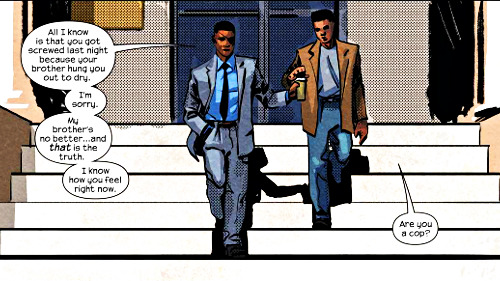
The conflict between Miles and Jefferson is left hanging until issues #8 and #9 of Miles Morales: The Ultimate Spider-Man – also known as “The Only Redeeming Thing About This Comic Book Title”. The eighth and ninth issues of MMTUSM sees Jefferson Davis finally owning up to his past and basically just spilling the beans about his life as a criminal with Aaron and how he became involved with S.H.I.E.L.D. during the 80s – when Miami Vice, Jerri Curls, House Party Flattops, and ill-fitting suits with shoulder pads were all the rage – and how he met a young, already-at-it, Nick Fury.
The complete tonal and visual shift in the issues are a welcome respite from the Peter Parker nonsense of the previous seven. The story arc, “Miles Morales: An Agent of S.H.I.E.L.D.?”, carries with it the kind’ve of visual flair I see a Tim Sale illustrated graphic novel (like Spider-Man: Blue or The Long Halloween), but it’s still David Marquez illustrating the story from beginning to end.
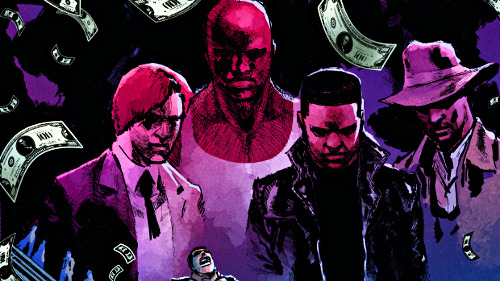
It’s got the look and feel of a pulp novel, or one of those old newspaper comic strips where the spots of the print were obvious through the inking and character sketches. The narrative, which sees Jefferson and Aaron working for smalltime criminals to Jefferson’s eventual graduation to protecting the Kingpin (with a minor explanation as to why he loathes mutants), is, in my opinion, the highlight of a story that could’ve worked as a full-fledged miniseries about the Jefferson brothers.
My only quibble with the framing of the narrative is that the early inclusion of S.H.I.E.L.D makes Jefferson look more like the unwilling participant of crime he was manipulated into thinking he had to do for “the greater good”, as opposed to some young blood who didn’t give much thought to right or wrong (which is how the early issues framed it) before he had an epiphany. I always assumed the crime came first, then S.H.I.E.L.D, then Rio. Honestly, if you’re at all interested in this storyline, just look for the single issues and don’t buy the trade. You’ll be doing yourself a favor.
#Issues 10-13
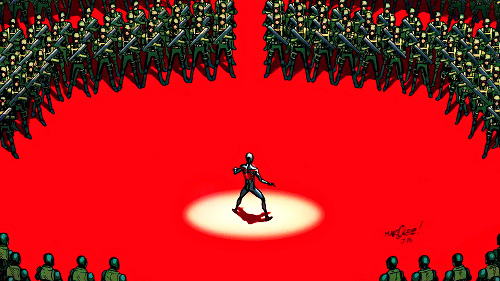
Marvel and its twisted, present-day romantic relationship with Neo-Nazism is a fairly ironic one, given most of its early artists were white Jewish dudes with alternate names designed to explicitly hide their Jewishness on account of antisemitism. But, I suppose the publications preoccupation with Nazism to begin with (even if it was denouncing it) would’ve inevitably steered its future publishers to romanticize it in the end. I mean, that’s what happened after all.
You know shit it bad when Marvel wants you to pity [white] characters like Grant Ward of Agents of S.H.I.E.L.D for joining a Neo-Nazi group, despite the repeated and angry affirmations of protagonist Daisy Johnson, who flat-out reminds the audience, “You are a Nazi if you join Hydra”, who is undermined anyway by the narrative that continues to bleat, “pity the Neo-Nazi.”
Brian Michael Bendis, in all his infinite lack of wisdom, decides – the biggest way to differ Miles Morales’ love life from Peter Parker’s, is make an underdeveloped character, his girlfriend, Ultimate Kate Bishop, a member of Hydra. Miles’ white girlfriend rides on the agenda of the Aryan Ideal and white supremacy. Brilliant.
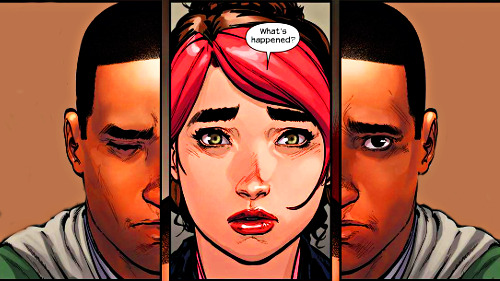
The Ultimate Spider-Man issues, #1-#4 and #7 prelude the last four issues with Miles deliberating whether or not he should tell Katie Bishop about his double life as Spider-Man. Instead of being supportive, everyone from Ganke to Cloak and Dagger warns Miles against telling her, thinking it would be a bad idea. He does it anyway, Katie panics and runs away.
The aforementioned issues give the reader a glimpse into Kate’s life with the Bishops, with one conversation with her older sister casually mentioning that “they” would have to kill Miles and the seventh issue concludes with her uttering the phrase, “Hail Hydra.”
If The Ultimate Spider-Man had something to say about the issue of Nazism, especially in relation to Miles’ life as a Black teen – or the cautionary tale of “you never know someone until…”, then I could maybe understand the decision to make Kate Bishop (a wildly popular Avenger in the 616 universe, be she an adult or a teenager) a Nazi.
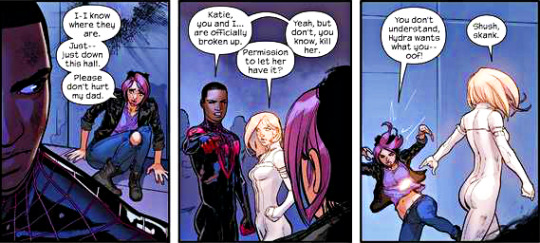
But, it doesn’t, it basically does exactly the same thing Agents of S.H.I.E.L.D does with the Daisy Johnson/Grant Ward dynamic. The narrative depicts a “Sympathetic Nazi” (Katie) trying to explain their position, and a furious significant other (Miles) outright declaring their relationship is over. Only, where AOS more or less dragged that subplot out to its natural conclusion (“Sympathetic Nazi” isn’t really sympathetic and dies),
The Ultimate Spider-Man did nothing to that extent. Readers barely have gotten to known Katie Bishop since her introduction in issue #23 of UCSM. She was given no time actually to be anything other than “Miles Morales’ girlfriend”. And when it comes right down to it, the Hydra subplot was nothing but an excuse to bring Dr. Doom into the narrative at the last moment. So, the “My Girlfriend is a Nazi” storyline just falls flat.
On a smaller note, the way the last couple issues decide to use Judge – the minor character from Ultimate Comics Spider-Man – is sigh inducing. It’s like Bendis realized his book was coming to an end and figured the best way to a handle a character that barely had any face time since the first twelve issues of the UCSM, is to just plop him in the middle of the story with his already knowing Miles is Spider-Man.
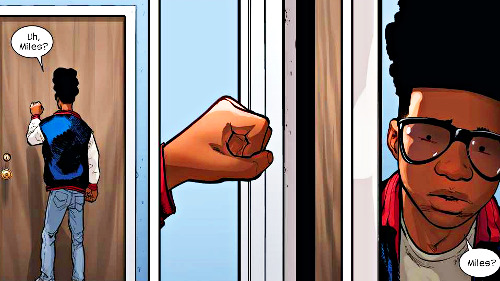
But, he does it in a way that, if you removed him from the story, nothing would change. It’s a superfluous addition and kind’ve discourteous, especially since Bendis doesn’t do anything with Judge later on in Miles’ new 616 title, the unfortunately named Spider-Man.
Outside of issues #8 and #9, Miles Morales: The Ultimate Spider-Man is a sad conclusion to Miles Ultimate Universe solo-title career. It reminded me why I stopped reading his title four years ago, and knowing that none of his recent stuff isn’t any good either kinda makes me glad I made the decision so early on.
#miles morales#spider man#katie bishop#brian michael bendis#david marquez#ultimate miles meta#1610 miles morales#1610 judge#1610 kate bishop#1610 jefferson davis#media: long posts
10 notes
·
View notes